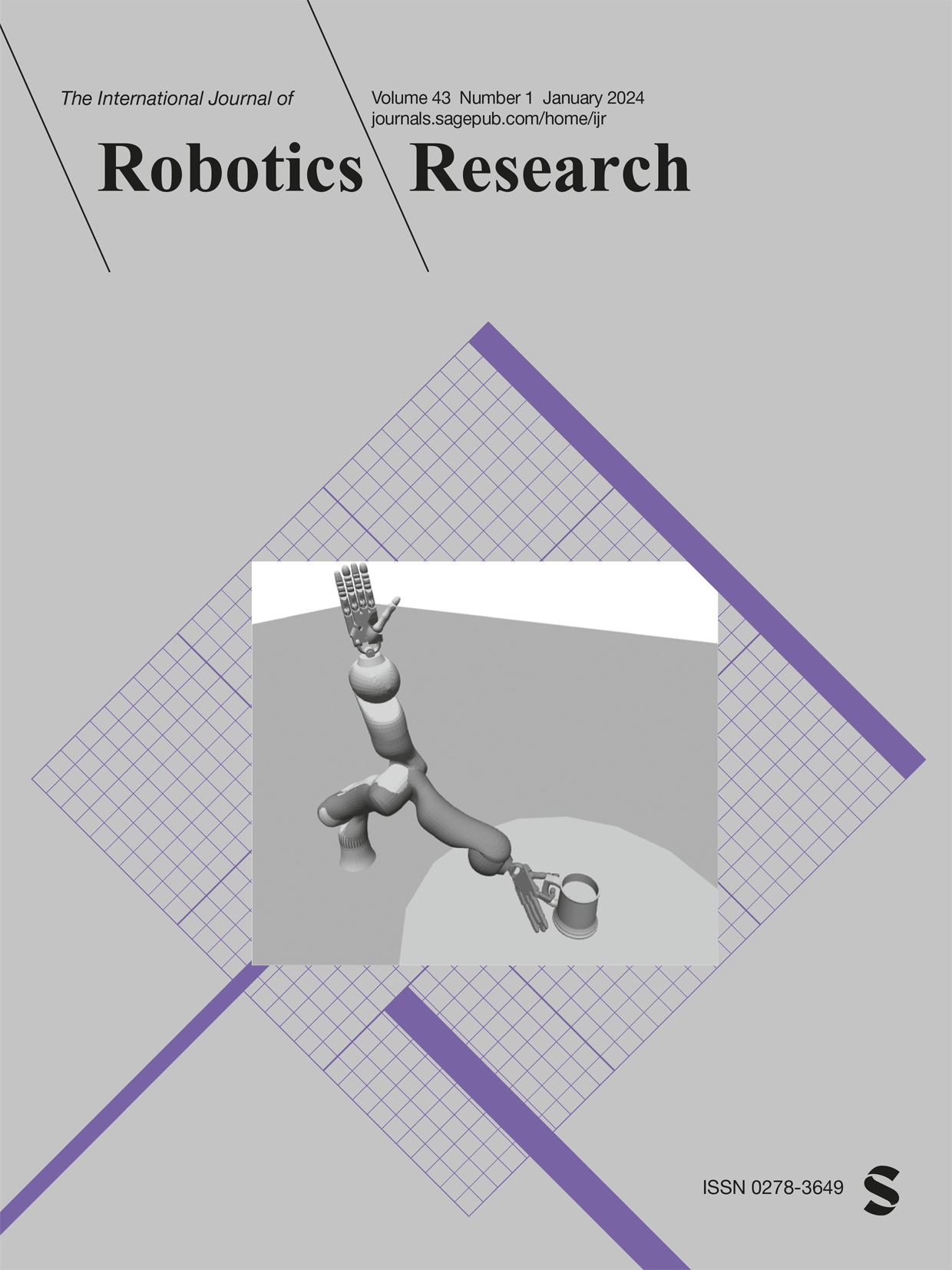ISRR’2019论文精选
IF 5
1区 计算机科学
Q1 ROBOTICS
引用次数: 0
摘要
本特刊由2019年10月6日至10日在越南河内举行的国际机器人研究研讨会(ISRR 2019)上发表的精选论文组成。会议听取了著名受邀发言者的精彩演讲,并在关于最近研究的论文海报上进行了积极讨论。自IJRR成立之初,ISRR会议就与IJRR建立了密切的关系,项目主席和联合主席向编委会提出了这一特刊,作为客座编辑,并邀请在许多高质量论文中获得高评价的投稿论文的作者提交作品的扩展版本。客座编辑对作者们的耐心表示诚挚的感谢,因为全球疫情造成的困难,审查过程放缓了,我们很高兴这期特刊终于完成了。该特刊反映了人工智能和自主性在机器人不同领域的最新进展,但也包括代表ISRR传统的基本贡献,尽管论文数量很少,但形成了涵盖机器人研究广泛领域的良好组合。虽然会议是在3年前举行的,但我们相信特刊提供了一个优秀的收藏,包括最新成果的更新。我们有两篇论文受益于人工智能和自主智能的高级研究,这两篇论文对高层规划特别有用。Adam Pacheck、Steven James、George Konidaris和Hadas Kress Gazit的第一篇论文“利用学习的抽象表示对反应性高级任务进行自动编码和修复”提出了基于技能的框架,通过用学习的抽象传感器数据对机器人技能进行编码,为要实现的任务找到可行的计划,从而实现反应性高级别任务的执行。Marcus Hoerger、Hanna Kurniawati和Alberto Elfes的第二篇题为“在线求解部分可观测马尔可夫决策过程的多层蒙特卡罗”的论文,通过多层POMDP规划器的原始方法,解决了具有复杂非线性动力学的部分可观测Markov决策过程(POMDP)的规划问题,以有效地获得接近最优的解。机器人学的基本贡献是关于操作和创新机器人设计的算法基础,每个主题包括两篇论文。“盲人旅行者问题:具有接触估计的运动规划搜索框架Bradley Saund、Sanjiban Choudhury、Siddhartha Srinivasa和Dmitry Berenson通过新颖的政策信念组合来处理包含未知有效性的图上的规划,该组合同时表达了碰撞概率和专家对碰撞的假设Bernardo Aceituno Cabezas、Jose Ballester和Alberto Rodriguez。本文提出了保证抓取成功的证书思想,导出了任意平面物体最优抓取的卷积公式。在机器人设计方面,潘哲荣、刘敏、高希峰和Dinesh Manocha的“平面连杆机构最优拓扑和轨迹的联合搜索”提出了一种新的方法,用于在优化机器人节点连接和连杆几何结构的基础上,找到最优平面连杆机构,使末端执行器绘制出用户定义的轨迹。赵、冈田惠和稻叶正树的另一篇设计论文《通用关节式空中机器人DRAGON:矢量推力控制的空中操纵和抓取》展示了一种独特的空中机器人,由具有飞行能力的连杆组成,可以通过协调推力控制来操纵各种物体。客座编辑感谢审稿人富有建设性和洞察力的评论,这些评论极大地帮助作者在2020年以来的特殊情况下改进了论文。我们还要感谢John Hollerbach教授和Antonio Bicchi教授有机会组织本期特刊,感谢Manish Nainwal和Sameer Grover在编辑管理方面的支持,感谢ISRR 2019组委会在处理相关信息方面的合作。我们希望您有幸阅读《国际机器人研究杂志》2019年ISRR特刊。特刊客座编辑本文章由计算机程序翻译,如有差异,请以英文原文为准。
Selected papers from ISRR'2019
This special issue is organized by selected papers presented at International Symposium on Robotics Research (ISRR 2019), held onOctober 6–10, 2019, at Hanoi, Vietnam. The conference enjoyed the distinguished talks by renowned invited speakers as well as active discussions at poster presentations of contributed papers on recent research. Following the strong relationship of the ISRR conferences with IJRR since its early years, the Program Chair and Co-Chairs proposed this special issue to the editorial board as guest editors and invited authors of contributed papers that received high review scores among many highquality papers to submit extended versions of the work. The guest editors would like to express their sincere gratitude to the authors for their patience by the review process that was slowed down due to the difficulties caused by the worldwide pandemic and are very delighted this special issue is finally complete. The special issue reflects the recent advancement of artificial intelligence and autonomy in different areas of robotics, but also includes the fundamental contributions that have been representing the tradition of ISRR, forming a good mixture covering broad areas of robotics research despite the small number of papers.While the conferencewas held 3 years back, we believe the special issue offers an excellent collection including updates with recent results. We have two papers that benefit from advanced research of artificial intelligence and autonomous agents especially useful for high-level planning. The first paper “Automatic Encoding and Repair of Reactive High-Level Tasks with Learned Abstract Representations” by Adam Pacheck, Steven James, George Konidaris, and Hadas Kress-Gazit presents skill-based framework enabling execution of reactive high-level tasks, by encoding robot skills with learned abstract sensor data to find a feasible plan for the task to be achieved. The second paper entitled “Multilevel Monte Carlo for Solving POMDPs Online” by Marcus Hoerger, Hanna Kurniawati, and Alberto Elfes addresses the challenging planning problem of Partially Observable Markov Decision Process (POMDP) with complex nonlinear dynamics, through an original approach of multi-level POMDP planner to obtain near-optimal solutions efficiently. The robotics fundamental contributions are about algorithmic foundation for manipulation and innovative robotics design and two papers are included for each topic. “The Blindfolded Traveler’s Problem: A Search Framework for Motion Planning with Contact Estimates" by Bradley Saund, Sanjiban Choudhury, Siddhartha Srinivasa, and Dmitry Berenson tackles planning on a graph containing unknown validity by novel policy-belief combination that expresses the collision probability and expert hypothesis about the collision at the same time. The secondmanipulation study is “The Certified Grasping” by Bernardo Aceituno-Cabezas, Jose Ballester, and Alberto Rodriguez. This paper proposes the idea of certificates to guarantee successful grasping, leading to convexcombinatorial formulation to derive optimal grasping of arbitrary planar objects. Regarding robotics design, “Joint Search of Optimal Topology and Trajectory for Planar Linkages” by Zherong Pan, Min Liu, Xifeng Gao, and Dinesh Manocha presents a new method for finding an optimal planar linkage such that the end-effector traces out a userdefined trajectory, based on optimization of both the robot node connection and link geometry. The other design paper “Versatile Articulated Aerial Robot DRAGON: Aerial Manipulation and Grasping by Vectorable Thrust Control” by Moju Zhao, Kei Okada, and Masauki Inaba demonstrates a unique aerial robot, composed of links with flying capacity, that can manipulate various objects by coordinated thrust control. The guest editors appreciate the reviewers for their constructive and insightful comments that greatly helped the authors improve their papers under unusual circumstances since 2020. We would also like to thank Prof. John Hollerbach and Antonio Bicchi for the opportunity to organize this special issue, Manish Nainwal and Sameer Grover for their support in editorial management, and the ISRR 2019 organizing committee for the cooperation in handling related information. We hope you have a pleasure of reading this special issue of The International Journal of Robotics Research dedicated to ISRR 2019. Special Issue Guest Editors
求助全文
通过发布文献求助,成功后即可免费获取论文全文。
去求助
来源期刊
CiteScore
22.20
自引率
0.00%
发文量
34
审稿时长
6-12 weeks
期刊介绍:
The International Journal of Robotics Research (IJRR) has been a leading peer-reviewed publication in the field for over two decades. It holds the distinction of being the first scholarly journal dedicated to robotics research.
IJRR presents cutting-edge and thought-provoking original research papers, articles, and reviews that delve into groundbreaking trends, technical advancements, and theoretical developments in robotics. Renowned scholars and practitioners contribute to its content, offering their expertise and insights. This journal covers a wide range of topics, going beyond narrow technical advancements to encompass various aspects of robotics.
The primary aim of IJRR is to publish work that has lasting value for the scientific and technological advancement of the field. Only original, robust, and practical research that can serve as a foundation for further progress is considered for publication. The focus is on producing content that will remain valuable and relevant over time.
In summary, IJRR stands as a prestigious publication that drives innovation and knowledge in robotics research.

 求助内容:
求助内容: 应助结果提醒方式:
应助结果提醒方式:


